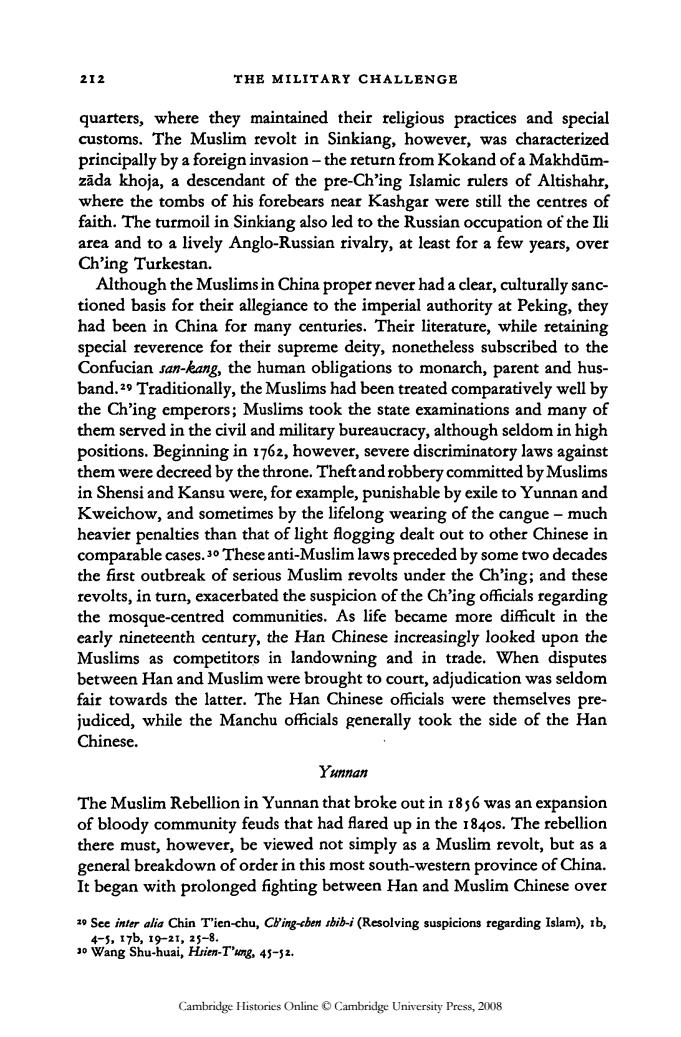正在加载图片...

2I2 THE MILITARY CHALLENGE quarters,where they maintained their religious practices and special customs.The Muslim revolt in Sinkiang,however,was characterized principally by a foreign invasion-the return from Kokand of a Makhdum- zada khoja,a descendant of the pre-Ch'ing Islamic rulers of Altishahr, where the tombs of his forebears near Kashgar were still the centres of faith.The turmoil in Sinkiang also led to the Russian occupation of the Ili area and to a lively Anglo-Russian rivalry,at least for a few years,over Ch'ing Turkestan. Although the Muslims in China proper never had a clear,culturally sanc- tioned basis for their allegiance to the imperial authority at Peking,they had been in China for many centuries.Their literature,while retaining special reverence for their supreme deity,nonetheless subscribed to the Confucian fan-ang,the human obligations to monarch,parent and hus- band.Traditionally,the Muslims had been treated comparatively well by the Ch'ing emperors;Muslims took the state examinations and many of them served in the civil and military bureaucracy,although seldom in high positions.Beginning in 1762,however,severe discriminatory laws against them were decreed by the throne.Theft and robbery committed by Muslims in Shensi and Kansu were,for example,punishable by exile to Yunnan and Kweichow,and sometimes by the lifelong wearing of the cangue-much heavier penalties than that of light flogging dealt out to other Chinese in comparable cases.These anti-Muslim laws preceded by some two decades the first outbreak of serious Muslim revolts under the Ch'ing;and these revolts,in turn,exacerbated the suspicion of the Ch'ing officials regarding the mosque-centred communities.As life became more difficult in the early nineteenth century,the Han Chinese increasingly looked upon the Muslims as competitors in landowning and in trade.When disputes between Han and Muslim were brought to court,adjudication was seldom fair towards the latter.The Han Chinese officials were themselves pre- judiced,while the Manchu officials generally took the side of the Han Chinese. Yunnan The Muslim Rebellion in Yunnan that broke out in 1856 was an expansion of bloody community feuds that had flared up in the 184os.The rebellion there must,however,be viewed not simply as a Muslim revolt,but as a general breakdown of order in this most south-western province of China. It began with prolonged fighting between Han and Muslim Chinese over See inter alia Chin Tien-chu,Cing-cben thib-i(Resolving suspicions regarding Islam),tb, 4-5,17b1921,25-8. 3o Wang Shu-huai,Hrien-T'smng,45-5z. Cambridge Histories Online O Cambridge University Press,2008212 THE MILITARY CHALLENGE quarters, where they maintained their religious practices and special customs. The Muslim revolt in Sinkiang, however, was characterized principally by a foreign invasion - the return from Kokand of a Makhdumzada khoja, a descendant of the pre-Ch'ing Islamic rulers of Altishahr, where the tombs of his forebears near Kashgar were still the centres of faith. The turmoil in Sinkiang also led to the Russian occupation of the Hi area and to a lively Anglo-Russian rivalry, at least for a few years, over Ch'ing Turkestan. Although the Muslims in China proper never had a clear, culturally sanctioned basis for their allegiance to the imperial authority at Peking, they had been in China for many centuries. Their literature, while retaining special reverence for their supreme deity, nonetheless subscribed to the Confucian san-kang, the human obligations to monarch, parent and husband.2 ' Traditionally, the Muslims had been treated comparatively well by the Ch'ing emperors; Muslims took the state examinations and many of them served in the civil and military bureaucracy, although seldom in high positions. Beginning in 1762, however, severe discriminatory laws against them were decreed by the throne. Theft and robbery committed by Muslims in Shensi and Kansu were, for example, punishable by exile to Yunnan and Kweichow, and sometimes by the lifelong wearing of the cangue - much heavier penalties than that of light flogging dealt out to other Chinese in comparable cases.30 These anti-Muslim laws preceded by some two decades the first outbreak of serious Muslim revolts under the Ch'ing; and these revolts, in turn, exacerbated the suspicion of the Ch'ing officials regarding the mosque-centred communities. As life became more difficult in the early nineteenth century, the Han Chinese increasingly looked upon the Muslims as competitors in landowning and in trade. When disputes between Han and Muslim were brought to court, adjudication was seldom fair towards the latter. The Han Chinese officials were themselves prejudiced, while the Manchu officials generally took the side of the Han Chinese. Yunnan The Muslim Rebellion in Yunnan that broke out in 18 5 6 was an expansion of bloody community feuds that had flared up in the 1840s. The rebellion there must, however, be viewed not simply as a Muslim revolt, but as a general breakdown of order in this most south-western province of China. It began with prolonged fighting between Han and Muslim Chinese over " See inter alia Chin T'ien-chu, CVing-cben Mb-i (Resolving suspicions regarding Islam), ib, 4-5, 17b, 19-21, 25-8. J0 Wang Shu-huai, Hiien-T'urtg, 45-52. Cambridge Histories Online © Cambridge University Press, 2008